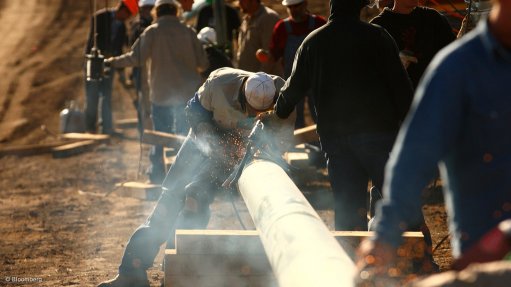
Photo by: Bloomberg
VANCOUVER (miningweekly.com) – The British Columbia provincial government has reiterated its opposition against the flow of oil over its soil.
While proponents for Kinder Morgan's Trans Mountain Expansion project have argued that the expansion of Canada's ability to reach new markets in Asia needs to be designated as a national priority, the provincial coalition government of British Columbia has again outlined plans to stop the project in its tracks.
“We have been clear and consistent that we will use every tool available to defend BC’s coast, and that is what we’re doing,” said Environment and Climate Change Strategy Minister George Heyman.
The provincial government, who's automobile licence plates bear the slogan "Beautiful British Columbia", on Thursday announced its intention to appear before the National Energy Board (NEB) regarding "constitutional issues" relating to Trans Mountain work at the Burnaby and Westridge marine terminals, located within the Burrard Inlet – a pristine marine environment surrounded by some of the most expensive real estate in the world.
Trans Mountain has approached the NEB to OK its starting terminal construction work without municipal consent.
At issue is a municipality deploying delay tactics and refusing to issue tree-cutting permits for the $7.4-billion expansion investment, which could become a gateway for Canada's third-largest oil reserves globally, to new markets. The opposition is driven by a clean-energy ideology, while its largest customer, the US, gives it the cold shoulder. The potential contribution the energy market could make to Canada's gross domestic product suffers as a result.
“While this is a direct matter between the company and the City of Burnaby, the constitutional issues raised may result in restricting BC’s involvement in defending provincial interests in the future. That is why we have advised the NEB that the Province of BC will be participating in this hearing,” stated Attorney General David Eby.
Thomas Berger, a Queen's Counsel member, on behalf of the provincial government, has asked the NEB to dismiss outright Trans Mountain’s suggestion of abridged timelines for future applications by Trans Mountain to challenge decisions of municipalities and the province regarding permits for the project. He said the province's position serves to ensure it has enough opportunity to defend its decisions in the future.
Berger was retained as external counsel to government in the legal actions related to the pipeline expansion project. He will be taking over as lead counsel in the province’s response to the court challenge brought by the Squamish Nation over the provincial approval of the project, and will advise the province on efforts to intervene in legal hearings surrounding the federal government’s approval of Trans Mountain.
There are currently 19 legal challenges against the project, which allege that the federal and provincial decisions to approve Trans Mountain were made unconstitutionally.
The project has undergone an unprecedented level of scrutiny and review and is subject to 157 conditions from the NEB and 37 conditions attached to the environmental certificate received early in January from the previous Liberal-led government of British Columbia.
Last year, the federal government, under Prime Minister Justin Trudeau, approved the project, which will match the existing 1953-built Trans Mountain pipeline system between Edmonton, Alberta, and Burnaby, British Columbia. This is expected to triple Canada’s access to new crude markets, as the country looks to diversify oil exports away from the US, its largest customer.
Canada supplies about 40% of US crude imports, giving it, as the fourth-largest oil producer in the world, far greater exposure to the largest crude consumer, ahead of top producers Saudi Arabia and Venezuela. But it needs to access new markets across the Pacific to wean it from its dependency on US trade, especially with a possible trade war brewing between the long-standing economic partners.
A date for the NEB hearing has not yet been set.